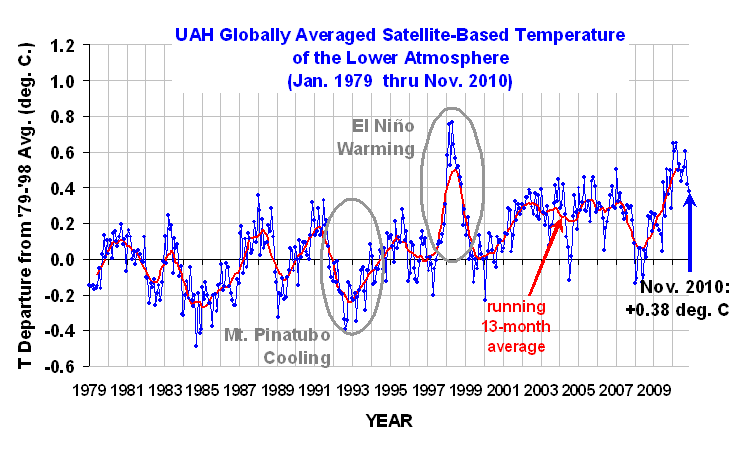NASA: Hottest November on record, 2010 likely hottest year on record globally — despite deepest solar minimum in a century
In U.S., heat records far exceed cold for 10th consecutive month
by Joseph Romm, Climate Progress, December 10, 2010NASA released its monthly global temperature data, revealing November was easily the hottest in the temperature record. The “meteorological year” — December to November — was also the hottest on record. Calendar year 2010 appears poised to be the hottest on record.
These records are especially impressive because we’re in the middle of a strong La Niña, which would normally cool off temperatures for a few months (relatively speaking), and we’ve been in “the deepest solar minimum in nearly a century.” It’s just hard to stop the march of manmade global warming, other than by sharply reducing greenhouse gas emissions, that is.
As for the U.S., Steve Scolnik at Capital Climate analyzed the data from NOAA’s National Climatic Data Center (NCDC) for his post, “November Temperature Extremes: Heat Records Far Exceed Cold For 10th Consecutive Month,” which notes:
As they have for every month in 2010 except January and February, U.S. daily maximum temperature records far exceeded minimum records in November. Thanks to a cold surge in the last week of the month, the ratio of heat records to cold records declined to 1.8:1, but the ratio of 2.7:1 for the year to date is still well above that of the most recent decade.
Heat records dominated cold records by a wide margin for most of the month, reaching a peak of 126 on the 23rd. Daily cold records, on the other hand, peaked at 90 on the 25th.
Readers know I like the statistical aggregation across the country, since it gets us beyond the oft-repeated point that you can’t pin any one record temperature on global warming.
If you want to know how to judge whether the 2.7:1 ratio for the year to data is a big deal, here’s what a 2009 National Center for Atmospheric Research study found for 1,800 weather stations in continental US over the past six decades:

NCAR explained their findings this way:
Spurred by a warming climate, daily record high temperatures occurred twice as often as record lows over the last decade across the continental United States, new research shows. The ratio of record highs to lows is likely to increase dramatically in coming decades if emissions of greenhouse gases continue to climb.
“Climate change is making itself felt in terms of day-to-day weather in the United States,” says Gerald Meehl, the lead author and a senior scientist at the National Center for Atmospheric Research (NCAR). “The ways these records are being broken show how our climate is already shifting.”So this year is on the hot side.
It seems pretty likely that the UK’s Met[eorological], part of its Defence Ministry, will also record 2010 as the hottest year on record — once they correct their flawed data in a few months — see The deniers were half right: The Met Office Hadley Centre had flawed data — but it led them to UNDERestimate the rate of recent global warming.
As an aside, I asked NASA’s James Hansen whether they would have to make a similar correction as the Met Office in the ocean data, and he wrote:
This correction of ocean data will have a small (warming) effect on our analysis. I don’t think that it will have a noticeable effect on a graph. But it does reinforce our conclusion that warming has been continuous over the past few decades — the contention that warming “stopped” in 1998 is wrong…
The effect on our ocean data, I suspect, will be smaller than the recent 0.03 °C/decade that Kennedy et al. state as upper limit for the effect.It remains the case that both NASA and the Met Office do not fully account for all of the warming in the Arctic, the place on the earth where it has warmed the most, but NASA does a better job (since the Met Office just excludes the area entirely) and so its numbers are almost certainly more accurate (see “Why are Hadley and CRU withholding vital climate data from the public?” and “What exactly is polar amplification and why does it matter?“).
So even if NASA declares 2010 a statistical tie with 2005, in reality it likely will be the hottest year.
As for the much-rejiggered UAH satellite data, it appears that even in the lower troposphere, 2010 temperatures will statistically tie the record for the hottest year, as Spencer reports on his blog. Although he has been been making increasingly unscientific and conspiratorial claims (see here), he does put out a nice figure every month:

NASA hasn’t yet posted its nice comparison chart of year-to-date temperatures updated for November yet (found here), but when they do, I’ll repost it. But in its place, here is there November 2010 anomaly figure:

Note: Gray areas signify missing data. Here’s the caption for the top two figures:
- Total number of daily high temperature, low temperature, and high minimum temperature records set in the U.S. for spring 2010 (March-April-May) and monthly from June through November 2010, data from NOAA National Climatic Data Center, background image © Kevin Ambrose (www.weatherbook.com). Includes historical daily observations archived in NCDC’s Cooperative Summary of the Day data set and preliminary reports from Cooperative Observers and First Order National Weather Service stations. All stations have a Period of Record of at least 30 years.Related post:
- Daily numbers of high and low temperature records set in the U.S. for November 2010, data source as above
- NASA: The 12-month running mean global temperature has reached a new record in 2010: “We conclude that global temperature continued to rise rapidly in the past decade” and “there has been no reduction in the global warming trend of 0.15-0.20 °C/decade that began in the late 1970s.”









No comments:
Post a Comment